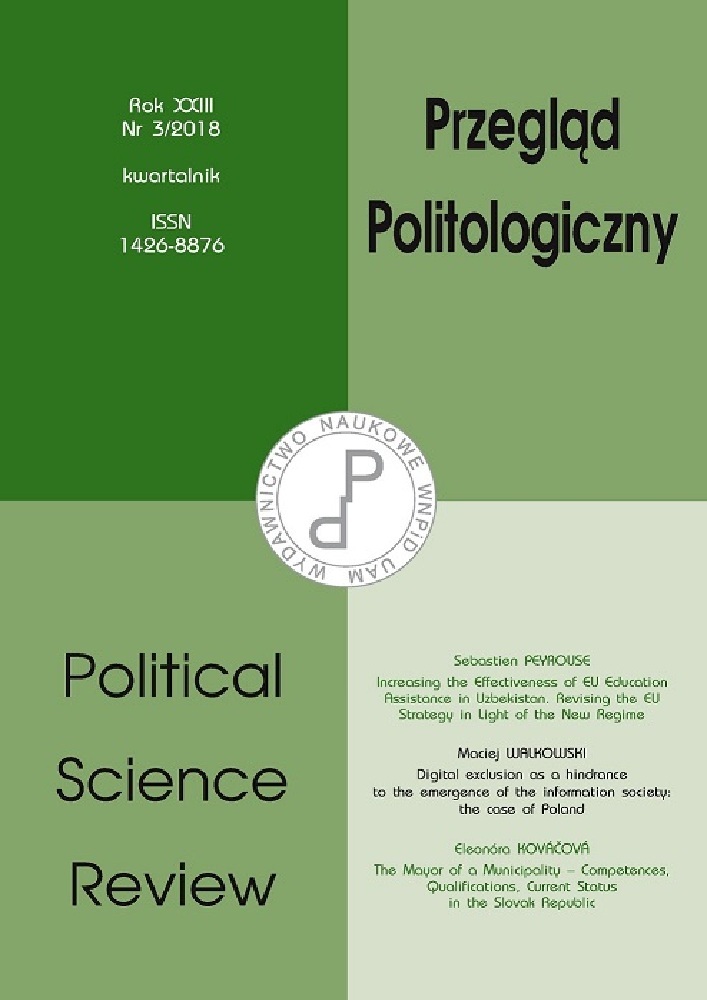Abstrakt
When Soviet Union collapsed, there were different hypothesis regarding democratic reforms and political system changes in Kyrgyzstan. It was believed that Kyrgyzstan would develop its independent policy and democratic governance. Since early 1990s European countries through OSCE, and later through the EU launched development projects have been playing central role in democracy promotion and civil society development in Central Asia. At the same time, as analysis show geopolitical interests of neighboring powerful states such as Russia and China increased in the region, which resulted the creation of regional institutions such as Shanhai Cooperation Organization (SCO), Collective Security Organization (CSO), Eurasian Economic Union (EEU) and Silk Road Belt Initiative (SRBI). While being the fully-fledged member of China and Russia led regional institutions, Kyrgyzstan is under heavy political and economic influence. Besides, human rights situation in Kyrgyzstan like in other Central Asian countries has been deteriorating for last few years. Thus, the research paper focuses on interplay between Russia and China for geopolitical dominance in the region, including how it negatively influences for political volatility, civil society suppression and deterioration of human rights issues. Paper equally analyzes European countries engagement in human rights and democracy promotion in Kyrgyzstan. The research considers important to analyze the EU strategy in democratic reforms in Central Asia and to investigate why it matters for the EU.
Bibliografia
Boonstra J. (2015), Reviewing the EU’s approach to Central Asia, Open Society Foundation, EUCAM#34, February.
Collins K. (2012), After the Kyrgyz Spring: Challenges to Democratic Deepening, “The Brown Journal of World Affairs,” vol. 19, no. 1.
Demes P. (2010), Twenty Years of Western Democracy Assistance in Central and Eastern Europe, International IDEA, Stockholm.
Gleason G. (1997), Central Asian States: Discovering Independence, West view Press.
Haghayeghi M. (1996), Islam and Politics in Central Asia, Macmillan, Palgrave.
Institute for Wars and Peace Reporting (2017), President’s Lawsuits Intimidate Kyrgyz Media, March 24, Kyrgyzstan, https://iwpr.net/global-voices/presidents-lawsuits-intimidate-kyrgyz-media
International Crisi Group, information about the vision and missionstatement of the NGO, http://www.crisisgroup.org.
International Crisis Group (2001), Kyrgyzstan at Ten: Trouble in the “Island of Democracy”, Report 22/Europe & Central Asia, 28 August.
International Media Support (2008), The examples of Kazakhstan and Kyrgyzstan: Political extremism, terrorism, and media in Central Asia, Copenhagen.
Kelly-Clark V. (2016), Why is Central Asia dumping Russia for China?, Global Risk Insights, May 23.
Khokhlova E., Freedom House classifies Kyrgyzstan as country with authoritarian regime, http://24.kg/english/48854_Freedom_House_classifies_Kyrgyzstan_as_country_with_authoritarian_regime/.
Manon R. (2007), Central Asia: Views from Washington, Moscow and Beijing, Published by M.E. Sharpe.
Marantidou V., Ralph A. C. (2014), China and Russia’s Great Game in Central Asia, “Magazine The National Interest,” https://nationalinterest.org/blog/the-buzz/china-russias-great-game-centralasia-11385.
Matveeva A. (2006), EU stakes in Central Asia, Institute for Security Studies, Paris.
Nicklass N., Svante K. (2016), The role of the European Union in democracy-building in Central Asia and the South Caucasus, International IDEA, Stockholm, Sweden.
Olcott M. B. (2007), Democracy Promotion in Central Asia: From High Expectations to Disillusionment, “Carnegie Endowment for International Peace,” February 10.
Omelicheva M. Y. (2015), Democracy and Dictatorship in Central Asia, http://www.oxfordbibliographies.com/view/document/obo-9780199756223/obo-9780199756223-0060.xml.
Orozbekova C. (2016), Central Asia’s Presidents-for-Life, http://thediplomat.com/2016/02/centralasias-presidents-for-life/.
Stratfor (2015), In Kazakhstan, Government Remains a Family Affair, October 21, https://worldview.stratfor.com/article/kazakhstan-government-remains-family-affair.
Tabaldieva D. (2017), Prospects for China – Kyrgyzstan Economic Relations in the Framework of the
Silk Road Economic Belt Project, http://china-trade-research.hktdc.com/business-news/article/The-Belt-and-Road-Initiative/Prospects-for-China-Kyrgyzstan-Economic-Relations-in-the-Framework-of-the-Silk-Road-Economic-Belt-Project/obor/en/1/1X000000/1X0A9JIX.htm.

